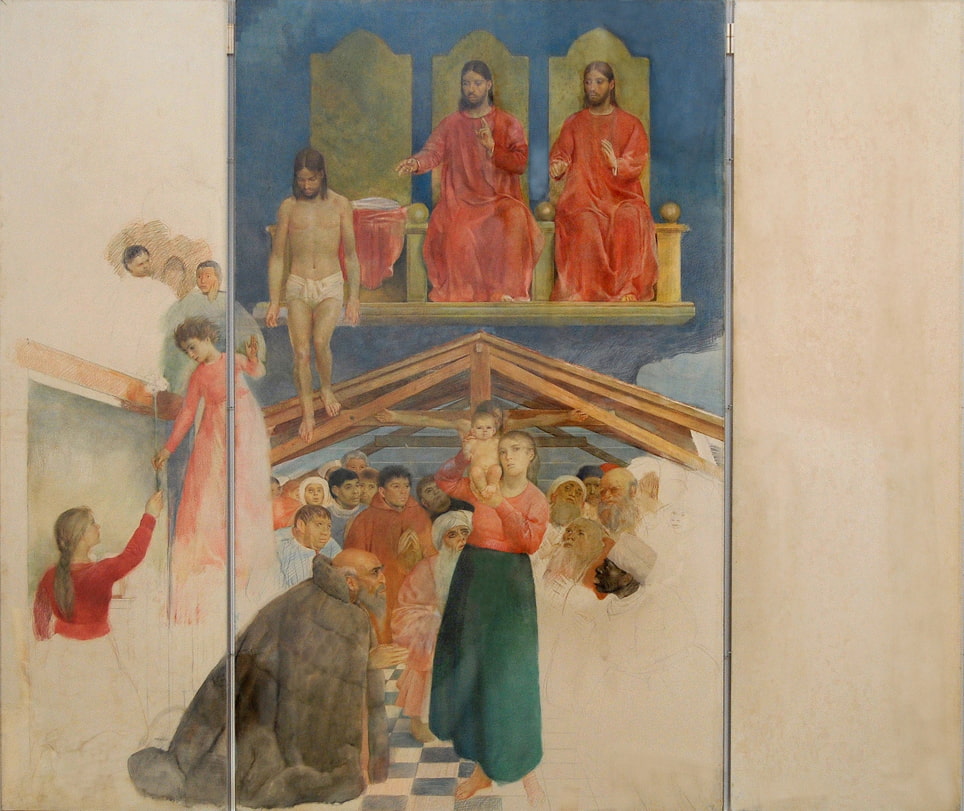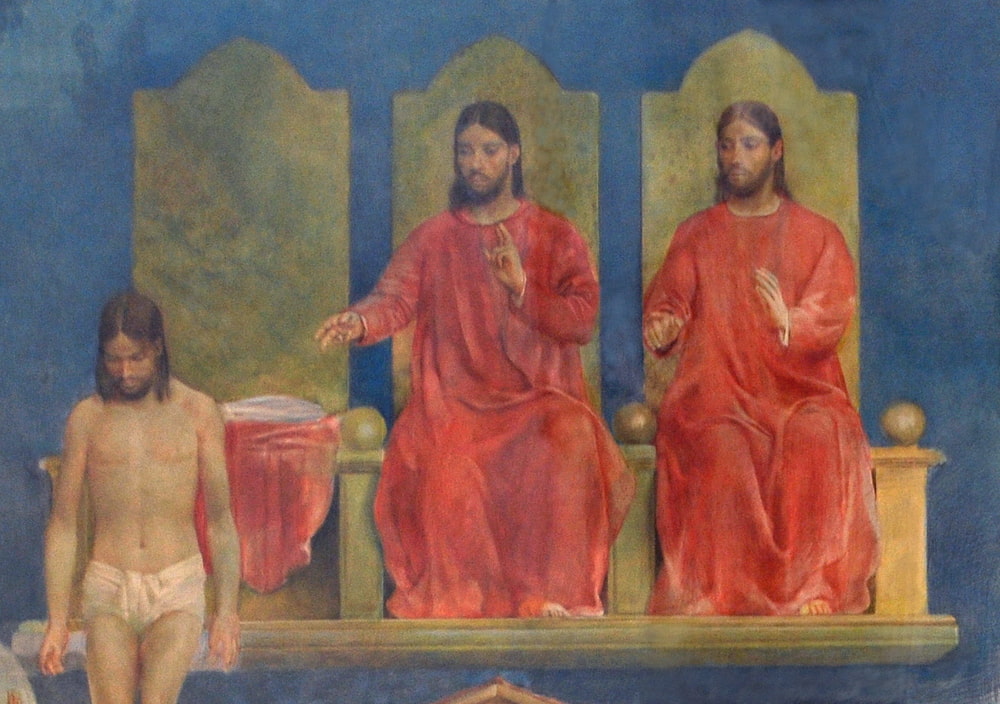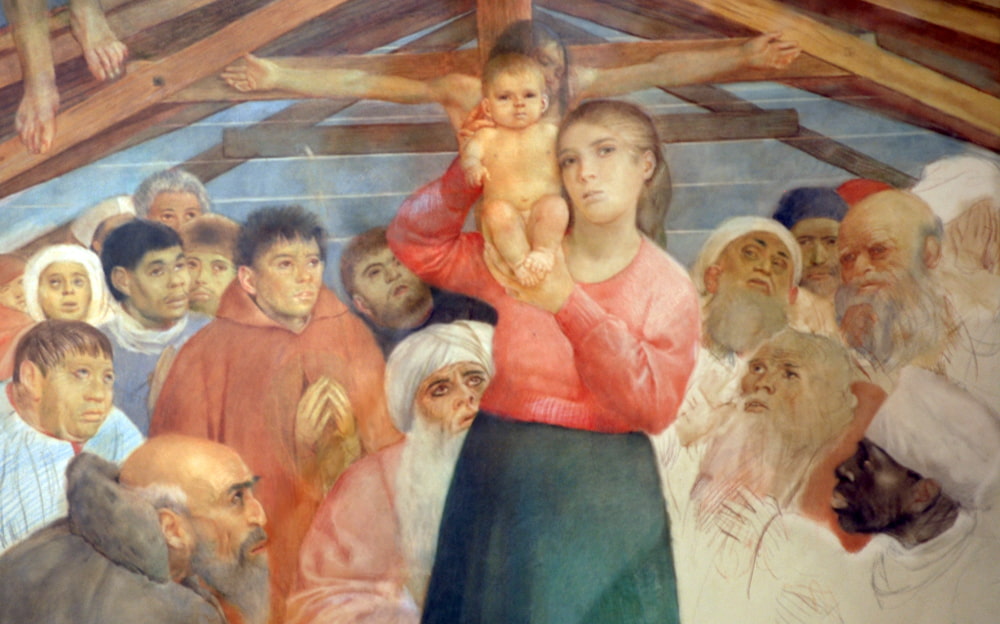December 13: Hymn of the Incarnation
♫ Music:
Day 17 - Tuesday, December 13
Title: HYMN OF THE INCARNATION
Scripture: Philippians 2:5-11
Let this mind be in you which was also in Christ Jesus, who, being in the form of God, did not consider it robbery to be equal with God, but made Himself of no reputation, taking the form of a bondservant, and coming in the likeness of men. And being found in appearance as a man, He humbled Himself and became obedient to the point of death, even the death of the cross. Therefore God also has highly exalted Him and given Him the name which is above every name, that at the name of Jesus every knee should bow, of those in heaven, and of those on earth, and of those under the earth, and that every tongue should confess that Jesus Christ is Lord, to the glory of God the Father.
Poetry & Poet:
“Immanence”
by Evelyn Underhill
I come in the little things,
Saith the Lord;
Not borne on morning wings
Of majesty; but I have set my feet
Amidst the delicate and bladed wheat
That springs triumphant in the furrowed sod—
There do I dwell, in weakness and in power;
Not broken or divided, said our God!
In your straight garden plot I come to flower;
About your porch my vine,
Meek, fruitful, doth entwine,
Waits, at the threshold, Love's appointed hour.
I come in the little things,
Saith the Lord;
Yea, on the glancing wings
Of eager birds, the soft and pattering feet
Of furred and gentle beasts, I come to meet
Your hard and wayward heart. In brown bright eyes
That peep from out the brake, I stand confest.
On every nest
Where feathery Patience is content to brood
And leaves her pleasure for the high emprise
Of motherhood—
There does my Godhead rest.
I come in the little things,
Saith the Lord;
My starry wings I do forsake,
Love's highway of humility to take;
Meekly I fit my stature to your need.
In beggar's part
About your gates I shall not cease to plead—
As man, to speak with man—
Till by such art
I shall achieve my immemorial plan;
Pass the low lintel of the human heart.
HYMN OF THE INCARNATION
In the fullness of time, God entered time, and joined us in our limitations.
Limitations can be challenging to receive and bear: our need for sleep, water and food, no matter how busy we are; aging bodies with declining mobility or cognition; illness that keeps us from our plans; the reality that as much as we sometimes wish, we cannot be in more than one place at once.
Even so, we are surrounded by messages that tell us that we can exceed our bodily bounds: technology offers access to a 24-hour news cycle, with up-to-the-minute commentary on events happening across the globe. Our phones keep us in communication with friends and family across continents. Social media gives us a sense of being connected at all hours of the day and night. Marketing campaigns tell us to “just do it,” “be all that you can be,” and even “No Limits!”
Though 2000 years ago and of an entirely different culture, our impulses against limitation would have resonated with the Philippian churches. The city of Philippi was modeled like a mini-Rome, operating within an ideology in which emperors sought to be worshiped as living gods. The Philippian churches were embedded in a society that took great pride in Roman heritage and citizenship, and sought after social position, wealth, ambition and upward mobility. Although they were saved and being sanctified by the Spirit, the values of Roman culture would have heavily influenced these believers and their churches. Limitations would have been a challenge for them, too.
To the Philippians then and to us today Paul writes: let your thinking and your mindset be that of Christ Jesus, rather than that of Rome. Rather than status, power, influence, wealth, or ambition, Jesus chose downward mobility. Jesus chose limitation.
Jesus chose the form of a bondservant, pictured appropriately by Rivier as removal of his status-marking robes as one of the Trinity. He chose to become someone with no reputation, influence, or social capital.
Jesus chose to take the form of human likeness, pictured poignantly by Rivier as an infant held in Mary’s arms. He took on the creaturely limitations of time, gravity and everyday needs of a physical body. “Meekly I fit my stature to your need,” writes Underhill, a God who needs food, sleep, shelter and relational connection to survive.
In a culture preoccupied with status, ambition, and wealth, this would have been startling. In our culture preoccupied with having more, being more, and doing more, this image of God choosing limitation is similarly stunning.
And yet, something about Jesus’ incarnation lends glory to the limitations with which we were created. I’m struck by Jesus in human likeness, and the ways he lived within those self-imposed limitations of human flesh. Underhill observes that even as he was constrained to coming “in the little things,” he gloried in them.
The lilies of the field.
The sparrows.
A touch on his garment in the midst of a crowd.
A nap in a boat.
A bonfire on a beach with some fish and some bread.
In his earthly life, Jesus gloried in creation, receiving the gifts of human limitation. May we so follow Jesus, receiving the gifts of our daily limitations and glorying “in the little things” of his creation.
Lisa Igram
Interim Vice President of Student Development
Dean of Student Wellness
Biola University
For more information about the artwork, music, and poetry selected for this day, we have provided resources under the “About” tab located next to the “Devotional” tab.
About the Artwork:
Triptych of the Incarnation
Charles Louis Rivier
1956–1959
Oil on canvas
250 x 290 cm
Saint-Etienne Church
Caen, France
This unfinished triptych by artist Charles Louis Rivier encapsulates the incarnation of Christ, who descended from the heavenly realms and “became flesh and dwelt among us” (John 1:14). The upper part of this triptych represents the Trinity in the form of three identical persons. The Son, after divesting himself of his robes, leaves his place on a shared common throne. As he descends to the lower level of the composition, Mary receives a white lily, a symbol of her spiritual purity, from the Angel Gabriel. In the center panel, the Magi and shepherds surround the Virgin. As they gather to adore the newborn Christ whom Mary holds on her shoulder, Christ is shown crucified on the wooden beams of the stable behind. Rivier abandoned the completion of this work in 1959, following an illness. This mural, the last work painted by Rivier, was intended for a church. Unfortunately, he died before completing it and there are no indications as to what the final panel, which remains blank, was meant to portray.
About the Artist:
Charles Louis Rivier (1885–1963) was a Swiss painter, writer, and stained-glass artist. He moved to Paris in 1904 to learn painting and worked in the studio of artist Jean-Paul Laurens. His frescoes and stained glass are found in many Protestant churches, notably in the Lausanne churches of Terreaux, de Villard, and de Saint-Jean de Cour. He was the creator of seventeen stained glass windows in the Cathedral of Lausanne. An excellent portrait painter, he executed over a hundred commissions, including five professorial portraits for the Senate Chamber at the Palais de Rumine in Lausanne. Rivier was awarded a gold medal by the Salon of the Society of French Artists and the Parisian Council of Arts, Sciences and Letters. He became a corresponding member of the Institut de France and a member of the Royal Society of Arts in London. According to the Association of Friends of Louis Rivier, the painter made between five to six hundred paintings during his lifetime.
http://www.artnet.com/artists/charles-louis-rivier/
http://www.art-louisrivier.ch/louis-rivier/biographie/
About the Music #1:
“The Song of Christ’s Glory” from the album Grayston Ives: Listen Sweet Dove
Lyrics #1: (Philippians 2.5–11)
Christ Jesus was in the form of God,
but he did not cling to equality with God.
He emptied himself,
taking the form of a servant,
and was born in the likeness of man.
Being found in human form,
he humbled himself,
and became obedient unto death,
even death on the cross.
Therefore God has highly exalted him,
and bestowed on him the
name above every name.
That at the name of Jesus
every knee should bow;
in heaven and on earth
and under the earth,
and every tongue confess
that Jesus Christ is Lord
to the glory of God the Father.
Amen.
About the Performers #1:
The Choir of Magdalen College, Oxford, was founded in 1480. The choir, which now enjoys an international reputation as one of the finest ensembles in the UK, exists primarily to sing the daily church services in Magdalen College Chapel. The choir has toured Japan, the USA, Hungary, Italy, Belgium, Holland, Germany, France, and Poland in recent years and their concert appearances have included the BBC Proms and Cadogan Hall. The choir has worked with a number of leading orchestras, including Britten Sinfonia, the Orchestra of the Age of Enlightenment, and the Academy of St. Martin in the Fields. Recordings have included the music of John Ward and Thomas Tomkins with the celebrated viol group Phantasm, and the work of the renowned composer of sacred music Matthew Martin. They won a Gramophone Award under former director Grayston Ives, and have collaborated with Sir Paul McCartney; with film composer George Fenton on Richard Attenborough’s movie Shadowlands; and on the award-winning soundtrack for BBC TV series Blue Planet.
https://www.magd.ox.ac.uk/chapel-and-choir/the-choir/
About the Composer #1: arranged by Grayston Ives
Grayston (Bill) Ives (b. 1948) is a British composer, singer, and choral director. Ives has spent his life in choral music—as a singer, conductor, teacher, and composer. A chorister at Ely Cathedral, he studied music at Cambridge, taking composition lessons with composer Sir Richard Rodney Bennett. After Cambridge he sang in Guildford Cathedral Choir before joining The King’s Singers, with whom he recorded and performed worldwide. For eighteen years Ives directed the Magdalen College Choir, Oxford. Highlights included a Grammy nomination for a recording of music by Orlando Gibbons, premiering Sir Paul McCartney’s Ecce Cor Meum, working with film composer George Fenton on the soundtracks of Blue Planet and Richard Attenborough’s Shadowlands, and recording backing tracks for singer Josh Groban’s platinum Christmas album Noël. Listen Sweet Dove, on the Harmonia Mundi label, features a selection of Bill’s compositions, performed by Magdalen College Choir under his direction. In 2008 he was awarded a Lambeth D.Mus. and a Fellowship of the Royal School of Church Music.
https://en.wikipedia.org/wiki/Grayston_Ives
https://graystonives.com/
About the Music #2:
“Come, Lord Jesus” from the album Prayers of the Saints - Live
Lyrics #2:
Verse 1
When the war is over and the battles are done
We shall see our Savior shining like the sun
Every tear He will dry, every shadow will flee
All those in Christ Jesus will be made complete
Will be made complete
Chorus
Come, Lord Jesus
Listen to creation groan
Come, Lord Jesus
Come and take Your people home
Verse 2
Every tongue will praise Him, every knee will bow
When we see our Savior riding on the clouds
Riding on the clouds
Bridge
Now we see in part, then we’ll see in full
Your glory, Jesus, will satisfy our souls
About the Performers #2:
Sovereign Grace Music featuring Lisa Clow
Sovereign Grace Music has been producing Christ-exalting songs and training for the church for thirty-five years, primarily to serve Sovereign Grace Churches, a family of churches joined together by a common mission to plant churches for the Kingdom of God. Like Charles Wesley, they wish they had “a thousand tongues to sing our great Redeemer’s praise. We pray the songs we write will produce the same desire in you, your family, and your church, for the never ending glory of God.”
https://sovereigngracemusic.org/about/
Lisa Clow is a freelance writer, artist, illustrator, performer, and designer. A member of the Society of Children’s Book Writers and Illustration, her recent manuscript for a middle grade novel received a Best/Most Publishable Honor at the SCBWI Midsouth Conference in March 2022. Her most recently published song, “From Everlasting,” was also released in March of 2022.
http://www.lisaclow.com/
About the Composer/Lyricist #2:
Marc Willerton is a Canadian singer/songwriter and the minister of worship at the Westside Church in Vancouver, British Columbia. Some of his songs include “My Hope Is In Christ,” “One Name (Worthy Is The Lamb),” “Lord Have Mercy,” “The First Noel (Born Is The King),” “He Is Risen,” and “Christ Has Come.”
About the Poetry & Poet:
Evelyn Underhill (1875–1941) was an English writer and pacifist whose works were driven by lifelong interest in Christian spirituality and mystical experience.
http://evelynunderhill.org/about/
About the Devotion Author:
Lisa Igram
Dean of Student Wellness
Biola University
Lisa Igram’s work in higher education includes a variety of classroom-teaching and co-curricular programming experiences in the U.S. and abroad. She currently serves as Interim Vice President of Student Development and Dean of Student Wellness, where she works with a team to create biblically-integrated learning experiences that promote the whole-person development of Biola’s undergraduate students. Lisa is currently pursuing a PhD in New Testament Studies at Aberdeen University, Scotland.


